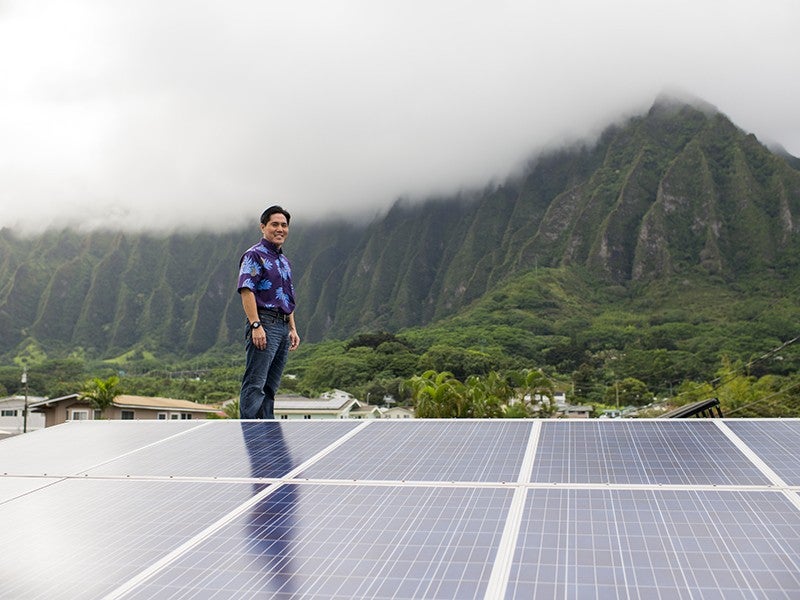Earthjustice Attorney Draws on Tradition to Revive Hawai‘i’s Streams
Recently promoted to lead Earthjustice’s Mid-Pacific Office, Isaac Moriwake fights to ensure that Hawaiʻi’s cultural and environmental values are reflected in the law.

This page was published 6 years ago. Find the latest on Earthjustice’s work.
For Isaac Moriwake, the path to practicing environmental law was part of a personal journey of rediscovering his home in Hawaiʻi.
Like many people born and raised in the islands, Moriwake grew up with a deep connection to the land and the ocean. In traditional Native Hawaiian culture, the ʻaina [land] is home, family, deity, and ancestor, and Earthjustice’s work continually strives to honor that tradition.
Recently promoted to lead Earthjustice’s Mid-Pacific Office as managing attorney, Moriwake is spearheading efforts to ensure that Hawaiʻi’s traditional cultural and environmental values are reflected in the law.
“The cool thing about Hawaiʻi water law is that the concept of water as a public trust — that it belongs to the people — is actually a traditional Hawaiian principle that has been reasserted in the law,” says Moriwake. “During the colonial period, plantations tried to turn water into private property, but modern court decisions have gone back to Hawaiian custom and tradition in saying that water was always a collective good and a legacy for all.”
Much of Moriwake’s work has focused on water rights and reversing the history of stream flow diversions by sugar plantations in Hawai‘i. Moriwake worked on a series of cases reaffirming that water is a public trust for all and restoring flows to rivers and streams on behalf of local and Native Hawaiian communities.
After years of citizen action and court battles led by Earthjustice, streams are once again coming back to life on Oʻahu, Maui, and Kauaʻi—but the larger fight to uphold public and native Hawaiian water rights across the islands continues.
“These are long-term battles against entrenched corporate and government powers, including some of the largest landowners in the state,” Moriwake says. “For our efforts to succeed over the long haul, they have to be based on a true partnership with the community from start to finish. Earthjustice’s free legal assistance provides an access to justice that our clients would otherwise not be able to afford, but we can’t win without solid grassroots community support and leadership.”
In addition to his work on water rights, Moriwake has driven efforts to establish Hawai‘i as a clean energy leader. Hawai‘i leads the world in rooftop solar adoption and became the first U.S. state to commit to a 100 percent renewable energy goal in 2015. The state continues to set examples for the rest of the country.
“Attitudes are shifting,” Moriwake says. “Hawaiʻi is one of the most isolated spots on Earth, yet we’ve been importing almost all of our energy and food. Now people are seeing that we’ve got all the energy we need here, in the sun and the wind and the waves.”
The Mid-Pacific Office, which recently celebrated its 30th anniversary, has a long track record in this “endangered species capital of the world” of protecting native birds, plants, and forests, as well as ocean resources like nearshore reef ecosystems and marine mammals. Because Hawaiʻi is also the global “ground zero” for producing genetically engineered crops, the Mid-Pacific Office has led the way in challenging the impacts of GE crops on our food supply, health, and environment.
Moriwake plans to continue all this work and more, in partnership with local communities.
“When I joined Earthjustice over 16 years ago, I would never have dreamed of one day leading our team in Hawai‘i,” says Moriwake. “So I can’t even say this is a ‘dream come true.’ It’s been one long wave, and I’m just happy to keep riding it. It is a privilege and kuleana [responsibility] to continue to work with our partner clients and communities to tackle the most pressing environmental and health threats in our region.”
Established in 1988, Earthjustice's Mid-Pacific Office, located in Honolulu, Hawaiʻi, works on a broad range of environmental and community health issues, including to ensure water is a public trust and to achieve a cleaner energy future.